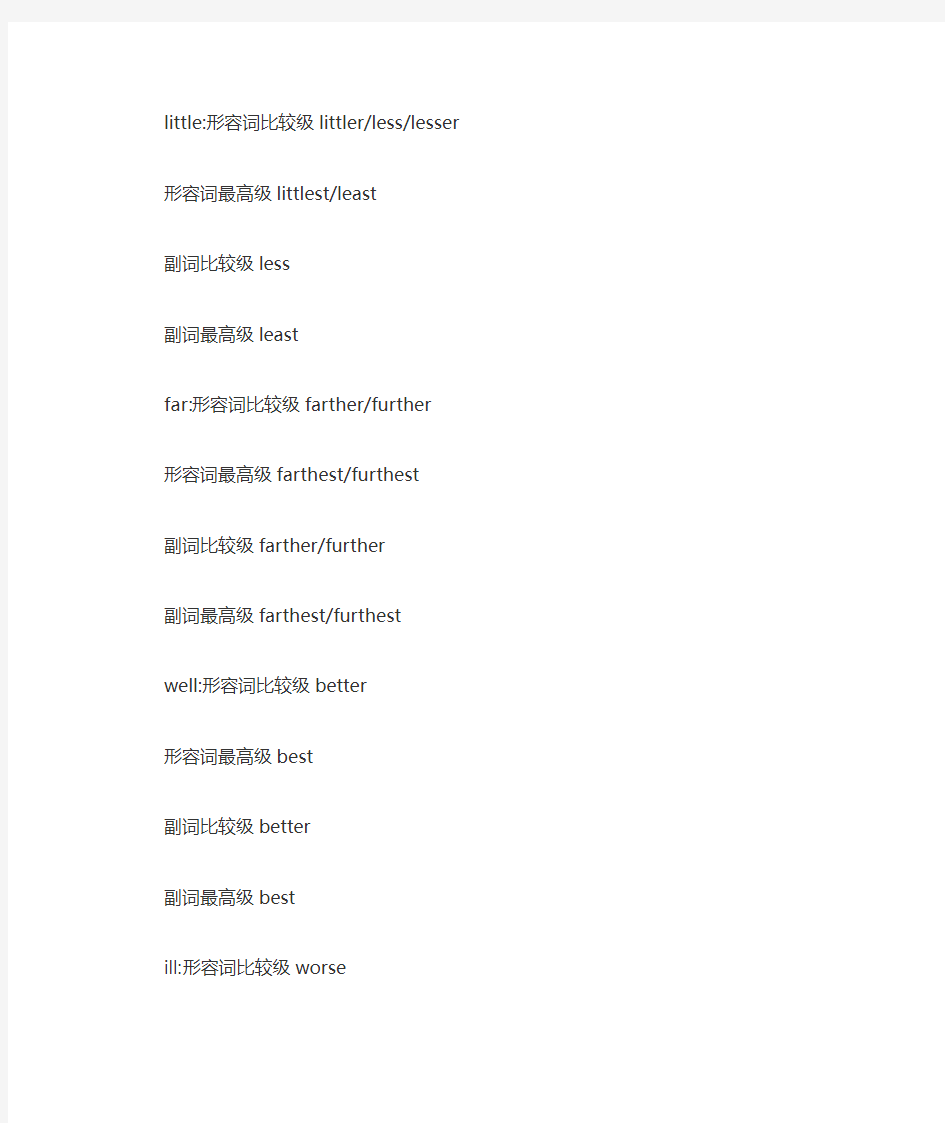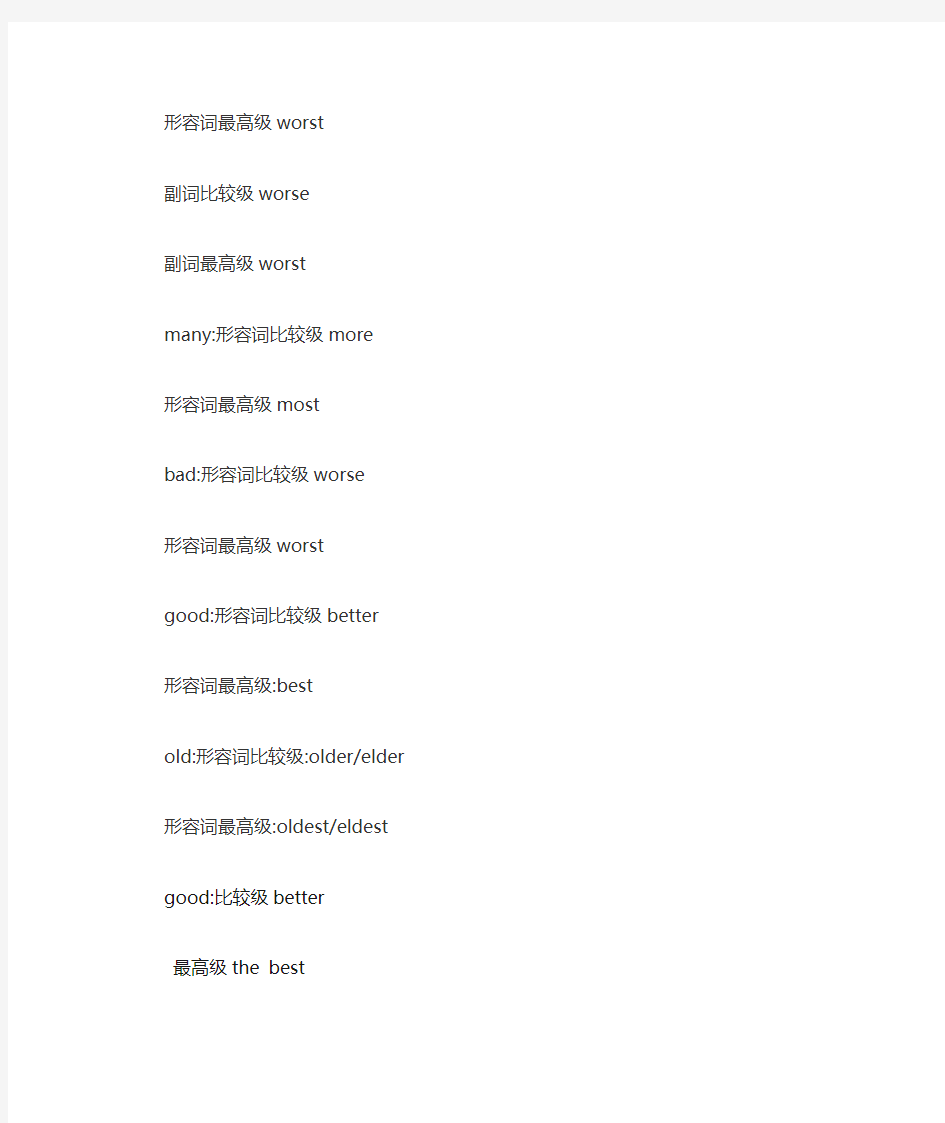

little:形容词比较级littler/less/lesser
形容词最高级littlest/least
副词比较级less
副词最高级least
far:形容词比较级farther/further
形容词最高级farthest/furthest
副词比较级farther/further
副词最高级farthest/furthest
well:形容词比较级better
形容词最高级best
副词比较级better
副词最高级best
ill:形容词比较级worse
形容词最高级worst
副词比较级worse
副词最高级worst
many:形容词比较级more
形容词最高级most
bad:形容词比较级worse
形容词最高级worst
good:形容词比较级better
形容词最高级:best
old:形容词比较级:older/elder
形容词最高级:oldest/eldest
good:比较级better
最高级the best
hot:比较级hotter
最高级the hottest
heavy:比较级heavier
最高级the heaviest
fine:比较级finer
最高级the finest
exciting:比较级more exciting
最高级the most exciting bad:比较级worse
最高级the worst
creative:比较级more creative
最高级the most creative boring:比较级more boring
最高级the most boring far:比较级farther/further
最高级the farthest/the furthest near:比较级nearer
最高级the nearest
学习必备欢迎下载 形容词和副词的比较级、最高级(Comparison of Adjectives and Adverbs) I.形容词比较级和最高级的形式 一、形容词比较级和最高级的构成 构成法①一般单音节词末尾加-er和-est 原级比较级最高级strong stronger strongest ②单音节词如果以-e结尾,只加-r和-st strange stranger strangest ③闭音节单音节词如末尾只有一个辅音字母, 须先双写这个辅音字母,再加-er和-est ④少数以-y,-er(或-ure),-ow,-ble结尾的双音节词, 末尾加-er和-est (以-y结尾的词,如y前是辅音字母,把y变成i,再加-er和-est, 以-e结尾的词仍加-r和-st)sad big ho t angry clever narrow noble sadder bigger hotter angrier cleverer narrower nobler saddest biggest hottest angriest cleverest narrowest noblest ⑤其他双音节和多音节词都在前面加单词mo r e和mo r e difficult mos t difficult 二、不规则形容词的比较级和最高级形式mos t difficult 原级good/well bad/ill many/much little few far 比较级 better worse mo r e less farther/further 最高级 best worst mos t least farthest/furthest II.副词比较级和最高级的形式副词比较级和最高级的变化形式与形容词基本上一样。 一、一般副词
比较级和最高级 1.用“as+原级+as”表示 Tom is as tall as Mike. 2.用“not as(so) +原级+as”或“less than”表示 I didn’t do my homework so(as) carefully as you. The picture is less attractive than that one. 3.用“比较级+than”表示 Our city is more beautiful than any other city in our country. 注意:1) 为了避免重复,在从句中常用one, that, those等词来代替前面提过的名词。 The weather here is warmer than that of Shanghai. The radios made in our factory are better than those in your factory. 2)比较等级应注意避免和包括自己的对象比。 比较级+than+ any other + 单数名词 all the other + 复数名词 anyone else any of the other + 复数名词 3)如果形容词作定语修饰一个单数可数名词,一般将不定冠词a/an放在形容词之后。 Our neighbour has _____ ours. A. as a big house as
B. as big a house as C. the same big house as D. house the same big as 4)比较级前一般不用冠词,但若表示“两者中较……时”。比较级前要加定冠词。若比较级后有名词,常在比较级前加不定冠词,表示泛指。 E.g. 他是两者中较高的一个 He is the taller of the two. 她唱得真动听!我可从未听过比这更好的嗓音了。 How beautifully she sings! I have never heard a better voice. 4. 三者或三者以上相比,表示最高级时,用“the +最高级”的结构表示,这种句式一般常有表示比较范围的介词短语。 Zhang Hua is the tallest of the three. He works (the) hardest in his class. That was the least exciting football game I’ve ever watched. This hotel is the most comfortable I’ve ever stayed. 注意:当最高级的前面无限定词the或有不定冠词a/an时,仅表示“很……,非常……” Monday is my busiest day. 星期一是我很忙的一天。 Qingdao is a most (very) beautiful coastal city. 青岛是一个非常美丽的海滨城市。 一、请写出下列形容词的比较级和最高级。 big ______ ______ small ______ ________ new ____?__ ________ tall ______ ______ short______ ________ old____?__ ________ weak ______ ______ strong ______ ______ fat____?__ ________ hot ______ ______ cold ______ ________ thin ____?__ ________ nice ______ _____ good ______ ________ high____?__ ________ low____?__ ________cheap______ ______ easy ______ ________
中考英语复习--比较级最高级总结及练习 形容词、副词比较级和最高级知识详解专练 一、概说 英语中的形容词和副词有三个等级,即原级、比较级和高最级。比较级主要用于两者比 较,最高级主要用于多者比较。 二、比较等级的构成 1. 通过加后缀-er和-est构成。 单音节和部分双音节词通过加后缀–er和-est构成比较级和最高级 原级比较级最高级 tall(高) taller tallest quiet(安静的) quieter quietest early(早) earlier earliest 注: (1) 若原级以字母e结尾,则只加-r和-st:fine—finer—finest。 (2) 若原级以“辅音字母+y”结尾,则应将y改为i,再加-er和-est构成比较级和最高级: dry—drier—driest。(例外:shy(害羞的)—shyer—shyest) (3) 若原级为重读闭音节结尾,且末尾只有一个辅音字母,则双写这个辅音字母后加词尾-er 和-est构成比较级和最高级:big—bigger—biggest。 2. 通过在其前加more和most构成。 多音节和部分双音节词通过在其前加more和most构成比较级和最高级: 原级比较级最高级 difficult(困难的) more difficult most difficult dangerous(危险的) more dangerous most dangerous bravely(勇敢地) more bravely most bravely 注: (1) 有的双音节词(如 clever, common, gentle, handsome, happy, narrow, polite, quiet, shallow, simple, stupid,often, seldom)可以有两种方式构成比较级和最高级级: clever—cleverer / more clever —cleverest / most clever often—more often / oftener—most often / oftenest。等。
课前准备:检查学生掌握单词情况(听写) 一、形容词、副词的比较级和最高级的构成规则 1.一般单音节词和少数以-er,-ow结尾的双音节词,比较级在后面加-er,最高级在后面加-est; (1)单音节词 如:small→smaller→smallest short→shorter→shortest tall→taller→tallest great→greater→greatest (2)双音节词 如:clever→cleverer→cleverest narrow→narrower→narrowest 2.以不发音e结尾的单音节词,比较在原级后加-r,最高级在原级后加-st; 如:large→larger→largest nice→nicer→nicest able→abler→ablest 3.在重读闭音节(即:辅音+元音+辅音)中,先双写末尾的辅音字母,比较级加-er,最高级加-est; 如:big→bigger→biggest hot→hotter→hottest fat→fatter→fattest 4.以“辅音字母+y”结尾的双音节词,把y改为i,比较级加-er,最高级加-est; 如:easy→easier→easiest heavy→heavier→heaviest busy→busier→busiest happy→happier→happiest 5.其他双音节词和多音节词,比较级在前面加more,最高级在前面加most; 如:beautiful→more beautiful→most beautiful different→more different→most different easily→more easily→mo st easily 注意:(1)形容词最高级前通常必须用定冠词 the,副词最高级前可不用。 例句: The Sahara is the biggest desert in the world. (2)形容词most前面没有the,不表示最高级的含义,只表示"非常"。 It is a most important problem. =It is a very important problem. 6.有少数形容词、副词的比较级和最高级是不规则的,必须熟记。 如:good→better→best well→better→best bad→worse→worst ill→worse→worst
英语比较级总汇大:big-bigger-biggest 小:small-smaller-smallest 大:large-larger-largest 聪明:smart-smarter- smartest 明亮:bright-brighter-brightest 昏暗:dark-darker-darkest 快:fast-faster-fastest 慢: slow-slower-slowest 热:hot-hotter-hottest 冷: cold-colder-coldest 容易:easy-easier-easiest 难: hard-harder-hardest 重:heavy-heavier-heaviest 轻:light-lighter-lightest 快乐:happy-happier-happiest 远:far-farther-farthest 早:early-earlier-earliest 迟:late-later-latest 干净:clean-cleaner-cleanest 脏:dirty-dirtier-dirtist 干燥:dry-drier-driest 潮湿:wet-wetter-wettest 新的:nice-nicer-nicest 宽:wide-wider-widest 好:good-better-best 好:well-better-best 坏:bad-worse-worst 新:new-newer-newest 许多:many/much-more-most 少:little-less-least 老:old-older-oldest 年轻:yong-yonger-yongest 短:short-shorter-shortest 长:long-longer-longest 低:low-lower-lowest 高:tall-taller-tallest 瘦:thin-thinner- thinnest 胖:fat-fatter-fattest 高(身高):High-higher-highest 忙:busy-busier-busiest 虚弱:weak-weaker-weakest 强壮:strong-stronger-strongest 友好:friendly---more friendly---the most friendly 有趣:interesting---more interesting-- -the most interesting 小心:carefully---more carefully- --the most carefully 重要:important-- more important--- the most important 漂亮:beautiful- -more beautiful-- the most beautiful
▲比较级、最高级: 大多数形容词和副词有三个等级: 1)原级,即原形。 2)比较级,表示“较……”或“更……一些”的意思。 3)最高级,表示“最……”的意思。 1.形容词和副词比较级和最高级的构成 (1)规则变化: 单音节词和少数双音节词(一般在词尾加-er或-est ) cold colder coldest strong stronger strongest fast faster fastest slow slow slowest 以字母e结尾的形容词,加-r或-st nice nicer nicest large larger largest 重读闭音节词只有一个辅音字母时,应先双写辅音字母,再加-er或-est big bigger biggest thin thinner thinnest hot hotter hottest 以“辅音字母+y”结尾的双音节词,先改“y”为“i”,再加-er或-est easy esaier easiest happy happier happiest early earlier earliest 少数以-er,-ow结尾的双音节词clever(聪明的)未尾加-er,-est clever cleverer cleverest narrow narrower narrowest 多音节词和部分双音节词,在词前加more或most delicious more delicious most delicious interesting more interesting most interting easily more easily most easily carefully more carefully most carefully (2)不规则变化 good/well better best bad/badly worse worst much/many more most little less least far farther/further farthest/furthest 2.形容词和副词的比较级和最高级的用法 比较级:表示两者(人或事物)的比较 Mr King is taller than Mr Read This mooncakes is nicer than that one。 The tractor is going faster than the bike。 最高级:表示三者或三者以上(人或事物)的比较,其中有一个在某一方面超过其他几个时,用最高级。最高级的前面一般要加定冠词the。后面可带of(in)短语来说明比较的范围。 Whose drawing is he best of all? She is the youngest in the class. Mr Qin is walking tje slowest of all. 注:在形容词和副词的比较级前,有时可以用much,a little等来修饰, 如:much better a little taller
比较级和最高级的练习表 1.在形容词词尾加上“er”“est” 构成比较级、最高级: bright(明亮的)—brighter—brightest broad(广阔的)—broader—broadest cheap(便宜的)—cheaper—cheapest clean(干净的)—cleaner—cleanest clever(聪明的)—cleverer—cleverest cold(寒冷的)—colder—coldest cool(凉的)—cooler—coolest dark(黑暗的)—darker—darkest dear(贵的)—dearer—dearest deep(深的)—deeper—deepest fast(迅速的)—faster—fastest few(少的)—fewer—fewest great(伟大的)—greater—greatest hard(困难的,硬的)—harder—hardest high(高的)—higher—highest kind(善良的)—kinder—kindest light(轻的)—lighter—lightest long(长的)—longer—longest loud(响亮的)—louder—loudest low(低的)—lower—lowest near(近的)—nearer—nearest new(新的)—newer—newest poor(穷的)—poorer—poorest quick(快的)—quicker—quickest quiet(安静的)—quieter—quietest rich(富裕的)—richer—richest short(短的)—shorter—shortest slow(慢的)—slower—slowest small(小的)—smaller—smallest smart(聪明的)—smarter—smartest soft(柔软的)—softer—softest strong(强壮的)—stronger—strongest sweet(甜的)—sweeter—sweetest tall(高的)-taller-tallest thick(厚的)—thicker—thickest warm(温暖的)—warmer—warmest weak(弱的)—weaker—weakest young(年轻的)—younger—youngest 2.双写最后一个字母,再加上“er”“est” 构成比较级、最高级: big(大的)—bigger—biggest fat(胖的)—fatter—fattest hot(热的)—hotter—hottest red(红的)—redder—reddest sad(伤心的)—sadder—saddest thin(瘦的)—thinner—thinnest wet(湿的)—wetter—wettest mad(疯的)—madder—maddest 3.以不发音的字母e结尾的形容词,加上“r”“st” 构成比较级、最高级: able(能干的)—abler—ablest brave(勇敢的)—braver—bravest close(接近的)—closer—closest fine(好的,完美的)—finer—finest large(巨大的)—larger—largest late(迟的)—later—latest nice(好的)—nicer—nicest ripe(成熟的)—riper—ripest rude(粗鲁的)—ruder—rudest safe(安全的)—safer—safest strange(奇怪的)—stranger—strangest wide(宽广的)—wider—widest wise(睿智的,聪明的)—wiser—wisest white(白的)—whiter—whitest 4.以字母y结尾的形容词,把y改为i,再加上“er”“est” 构成比较级、最高级: 学习资料
☆形容词的比较级☆ 当我们需要对事物作出比较时,需要用到比较级。 比较级的句子结构通常是: 什么 + 动词be (am , is , are ) + 形容词比较级 + than(比)+ 什么 ,如: I’m taller and heavier than you. (我比你更高和更重。) An elephant is bigger than a tiger.(一只大象比一只老虎更大。)形容词的比较级是在形容词的基础上变化而来的,它的变化规则是: ①一般的直接在词尾加er ,如 tall - taller , strong - stronger , ②以e结尾的,直接加r ,如 fine – finer , ③以辅音字母加y结尾的,先改y为i再加er,如funny - funnier ④双写最后的字母再加er,如big – bigger, thin – thinner , hot – hotter 除此之外,还有几个特殊的单词,它的比较级和最高级都是不规则的,如:many / much(原形)– more(比较级)– most(最高级) little / few(原形)– less (比较级)– least(最高级) good(原形)– better(比较级)– best(最高级) bad (原形)– worse(比较级)– worst(最高级) far (原形)– further– furthest 附加:形容词的最高级变化类似于比较级,只是把词尾的er改成est,如: tall (原形)- taller (比较级)- tallest (最高级) long(原形)- longer(比较级)- longest(最高级) big (原形)- bigger(比较级)- biggest(最高级) ☆注意☆比较的两者应该是互相对应的可比较的东西。
英语比较级和最高级的用法 一、形容词、副词的比较级和最高级的构成规则 1.一般单音节词和少数以-er,-ow结尾的双音节词,比较级在后面加-er,最高级在后面加-est; (1)单音节词 如:small→smaller→smallest short→shorter→shortest tall→taller→tallest great→greater→greatest (2)双音节词 如:clever→cleverer→cleverest narrow→narrower→narro west 2.以不发音e结尾的单音节词,比较在原级后加-r,最高级在原级后加-st; 如:large→larger→largest nice→nicer→nicest able→abler→ablest 3.在重读闭音节(即:辅音+元音+辅音)中,先双写末尾的辅音字母,比较级加-er,最高级加-est; 如:big→bigger→biggest hot→hotter→hottest fat→fatter→fattest 4.以“辅音字母+y”结尾的双音节词,把y改为i,比较级加-er,最高级加-est; 如:easy→easier→easiest heavy→heavier→heaviest busy→busier→busiest happy→happier→happiest 5.其他双音节词和多音节词,比较级在前面加more,最高级在前面加most; 如:beautiful→more beautiful→most beautiful different→more different→most different easily→more easily→most e asily 注意:(1)形容词最高级前通常必须用定冠词 the,副词最高级前可不用。 例句: The Sahara is the biggest desert in the world. (2) 形容词most前面没有the,不表示最高级的含义,只表示"非常"。 It is a most important problem. =It is a very important problem. 6.有少数形容词、副词的比较级和最高级是不规则的,必须熟记。 如:good→better→best well→better→best bad→worse→worst ill→worse→worst
形容词与副词比较级与最高级用法 形容词与副词的比较级: 大多数形容词和副词有比较级和最高级的变化,即原级、比较级和最高级,用来表示事物的等级差别。原级即形容词的原形,比较级和最高级有规则变化和不规则变化两种。 1.规则变化 单音节词和少数双音节词,加词尾-er,-est来构成比较级和最高级 注意: (1)old 有两种比较级和最高级形式:older/oldest 和elder/eldest。elder/eldest 只多用于兄弟姐妹的长幼关系。 My elder brother is an engineer.
Mary is the eldest of the three sisters. (2)far 有两种比较级farther和further。在英语中两者都可指距离。在美语中,farther 表示距离,further表示进一步。 I have nothing further to say. 3.几个常用的基本句型: as + 形容词或副词原级+ as 形容词或副词比较级+ than the + 最高级+ 比较范围 注意: (1)要避免重复使用比较级。 (错) He is more cleverer than his brother. (对) He is more clever than his brother. (对) He is cleverer than his brother. (2)要避免将主语含在比较对象中。 (错) China is larger that any country in Asia. (对) China is larger than any other country in Asia. (3)要注意对应句型,遵循前后一致的原则。 The population of Shanghai is larger than that of Beijing. It is easier to make a plan than to carry it out. (4)要注意冠词的使用,后有名词的时候,前面才有可能有冠词。 比较:Which is large, Canada or Australia? Which is the larger country, Canada or Australia? She is taller than her two sisters. She is the taller of the two sisters. ※可修饰比较级的词 a bit, a little, rather, much, far, by far, many, a lot, lots, a great deal, any, still, even等。 ▲the + 最高级+ 比较范围 (1)The Sahara is the biggest desert in the world. ※形容词最高级前通常必须用定冠词the,副词最高级前可不用。 形容词most前面没有the,不表示最高级的含义,只表示“非常” It is a most important problem. =It is a very important problem. 注意:使用最高级要注意将主语包括在比较范围内。 (错)Tom is the tallest of his three brothers. (对)Tom is the tallest of the three brothers. (2)下列词可修饰最高级:by far, far, much, mostly, almost This hat is nearly / almost the biggest. (3)句型转换: Mike is the most intelligent in his class.
Grammar 1. 形容词/副词的比较等级 (1)—用法讲解大多数的形容词都有三个级别:原级、比较级、最高级。 其中比较级表示“更……”,用于两者之间的比较,用来说明“前者比后者更……”,比较级前面一般用much, even, a little修饰,其中even, much 只能修饰比较级。 最高级表示“最……”,用于三者及三者以上之间的比较,用来说明“某人或某物在某个范围内最……” ①形容词的比较级(-er)和最高级(-est)的构成 a. 规则变化之口诀:直接加;去e加;双写加;变y加; more/ most b. 不规则变化原级比较级最高级good / well better best bad / ill worse worst many / much more most little less least far farther, further farther, further old older, elder oldest, eldest ②比较级前的修饰语still, even, any, quite(a bit), almost, nearly, just, rather;a little, a bit;much, a lot, far, many;twice, ten times, one fourth, two pounds, three years (2)—常见句型 ①A=B A+ be + as + adj./adv. + as + B (与。。。一样) He is as tall as I/me. 他和我一样高。 He is as good a teacher as his father.他和他的父亲一样是个好教师。 ②A≠ B A + be+ not + as/so + adj./adv. + as + B (与。。。不一样) They didn’t do as/so much work as you did. 他们干得事没有你多。 I’ve never seen as/so old a car as this.我从来没有见过像这样旧的车。 ③A > B 或A < B A + be + 比较级+ than + B (比。。。更。。。) Tom is two years older than his brother. 汤姆比他的弟弟大两岁。 Our classroom is bigger than theirs. 我们的教室比他们的大。 ④表示倍数A + be + twice/four times/…+ as + adj./adv. + as + B(A是B的两倍/四倍/…)This room is twice as large as that one. 整个房间是那房间的两倍大。 The earth is 49 times as big as the moon.地球是月球的49倍大。 ⑤表示程度的递增主语+ V + 比较级+ and+比较级(…越来越…) 主语+ V + more and more+ +adj./adv. (…越来越…) The days are getting shorter and shorter.白天变得越来越长了。 Our country is becoming more and more beautiful.我们的国家变得越来越美了。 ⑥表示两种情况同时变化The+ 比较级+ 主语+ V + …,the+ 比较级+ 主语+ V
一、比较级和最高级的讲解 1.一般单音节词和少数以-er,-ow结尾的双音节词,比较级在后面加-er,最高级在后面加-est; (1)单音节词 如:small→smaller→smallest short→shorter→shortest tall→taller→tallest great→greater→greatest (2)双音节词 如:clever→cleverer→cleverest narrow→narrower→narrowes t 2.以不发音e结尾的单音节词,比较在原级后加-r,最高级在原级后加-st;如:large→larger→largest nice→nicer→nicest able→abler→ablest 3.在重读闭音节(即:辅音+元音+辅音)中,先双写末尾的辅音字母,比较级加-er,最高级加-est; 如:big→bigger→biggest hot→hotter→hottest fat→fatter→fattest 4.以“辅音字母+y”结尾的双音节词,把y改为i,比较级加-er,最高级加-est;如:easy→easier→easiest heavy→heavier→heaviest busy→busier→busiest happy→happier→happiest 5.其他双音节词和多音节词,比较级在前面加more,最高级在前面加most;如:beautiful→more beautiful→most beautiful different→more different→most different easily→more easily→most e asily 注意:(1)形容词最高级前通常必须用定冠词the,副词最高级前可不用。例句:The Sahara is the biggest desert in the world. (2)形容词most前面没有the,不表示最高级的含义,只表示"非常"。 It is a most important problem. =It is a very important problem. 6.有少数形容词、副词的比较级和最高级是不规则的,必须熟记。 如:good→better→best well→better→best bad→worse→worst ill→worse→worst old→older/elder→oldest/eldest many/much→more→most little→less→least far →further/farther→ furthest/farthest 二、形容词、副词的比较级和最高级的用法 1.“A + be +形容词比较级+ than + B” 意思为“A比B更……”。 如:This tree is taller than that one. 这棵树比那棵树高。 注意: ①在含有连词than的比较级中,前后的比较对象必须是同一范畴,即同类事物之间的比较。 ②在比较级前面使用much,表示程度程度“强得多”。 如:A watermelon is much bigger than an apple. ③very, quite一般只能修饰原级,不能修饰比较级。 2.“比较级+ and + 比较级”或“more and more +原级”表示“越来越……”
2017年全国中考英语:形容词的比较级和最高级 1、(2017?西宁)---Many boy students think math is ______ English. ---I agree. I'm weak in English. () A. much difficult than B. so difficult as C. less difficult than D. more difficult than 【考点】形容词的比较级和最高级。 【分析】--许多男生认为数学不如英语难。--我赞成。我英语很差。 【解答】答案:C 联系汉语意思可知,这是math(数学)和English(英语)两者作比较,应该使用比较级。根据I agree. I'm weak in English可知,下文赞成上文的说法,表示数学不如英语难,所以此处应用表示"不如…难"的意思。又知much difficult than有语法错误,much修饰比较级;so difficult as意为和…一样难;less difficult than意为不如…难;more difficult than意为比…更难。所以此处应用less difficult than。故选C。 2、(2017?荆州)---How was your interview for the work? ---Oh,I couldn’t feel any . I hardly understood most of the questions they asked. () A. harder B. happier C. better D. worse 【考点】形容词的比较级和最高级。 【分析】翻译:你的工作面试怎样?哦,我感觉不能再糟糕了。我几乎不理解他们问的大部分的问题。 【解答】答案:D. harder是更难的意思,happier是更开心的意思,better是更好的意思,worse是更差的意思,因为下句是I hardly understood most of the questions they asked(我几乎不理解他们问的大部分的问题),所以该用感觉更差,故选D。 3、(2017?张家界)No mountain in the world is as ________ as Qomolangma. A. high B. higher C. highest
1) 经常用来修饰形容词或副词的比较级形式,以示加强语气。常见的词或短语有:much (very much,too much ),even,still,far,rather,any, no,not,by far, a lot,a little,a bit,a great deal 等。 He is getting (too) much fatter these days (加强语气时,可以使用too much 或 very much。) It was cold yesterday, but it’s even colder today. There was a number of people out this afternoon, far more than last Sunday. His work is better by far than that of any other printer in the city. She was by far the better actress in the West. 2)经常用来修饰形容词或副词的最高级,用来加强语气。常见的词或短语。如:much the ,the very , the ,by far,by far the ,not quite the, nearly, almost, 等。 【注】:very不能修饰比较级,却可修饰最高级,但它与一般的修饰最高级的副词有所不同,即它要放在最高级前的定冠词之后,而不是之前。(另外,second, third, next等也要放在定冠词之后) This is much the / by far the most difficult of the five questions. (much经常置于定冠词之前。) The last novel of his is by far the best he has written. The Pacific is the largest ocean in the world by far. (by far可以置于定冠词之前,也可以置于最高级之后。) This cake ought to be good, because I used the very best butter. 【辨析】far,by far 1.作程度副词时,far和by far近义;far表示“很”、“极”、“大大地”(much)或“太/过于”(too much)的意思,byfar是“最为…/更为…”的意思。二者使用时有下列两点需要注意: (一)far经常用在形容词比较级之前,而by far一般多用在最高级之前,例: It is far colder today than yesterday. 今天的天气比昨天冷得多。 Among these five gadgets,this one is by far the most useful. 在这五个新玩意儿中,这个最为有用。 This is by far the better method. 这方法比另一个更完善得多。 (二)使用by far时,随后的形容词最高级及比较级都附有定冠词the,而far 之后的比较级形容词则没有the.例: She is by far the best of the students in class. 她是班里最好的学生。 She is far better than the other students. 她比其他学生更优秀。
PEP小学英语常见形容词及比较级、最高级变化一览表 1.在形容词词尾加上“er” “est” 构成比较级、最高级: bright(明亮的)—brighter—brightest broad(广阔的)—broader—broadest cheap(便宜的)—cheaper—cheapest clean(干净的)—cleaner—cleanest clever(聪明的)—cleverer—cleverest cold(寒冷的)—colder—coldest cool(凉的)—cooler—coolest dark(黑暗的)—darker—darkest dear(贵的)—dearer—dearest deep(深的)—deeper—deepest fast(迅速的)—faster—fastest few(少的)—fewer—fewest great(伟大的)—greater—greatest hard(困难的,硬的)—harder—hardest high(高的)—higher—highest kind(善良的)—kinder—kindest light(轻的)—lighter—lightest long(长的)—longer—longest loud(响亮的)—louder—loudest low(低的)—lower—lowest near(近的)—nearer—nearest new(新的)—newer—newest poor(穷的)—poorer—poorest quick(快的)—quicker—quickest quiet(安静的)—quieter—quietest rich(富裕的)—richer—richest short(短的)—shorter—shortest slow(慢的)—slower—slowest small(小的)—smaller—smallest smart(聪明的)—smarter—smartest soft(柔软的)—softer—softest strong(强壮的)—stronger—strongest sweet(甜的)—sweeter—sweetest tall(高的)-taller-tallest thick(厚的)—thicker—thickest warm(温暖的)—warmer—warmest weak(弱的)—weaker—weakest young(年轻的)—younger—youngest 2.双写最后一个字母,再加上“er” “est”构成比较级、最高级: big(大的)—bigger—biggest fat(胖的)—fatter—fattest hot(热的)—hotter—hottest red(红的)—redder—reddest sad(伤心的)—sadder—saddest thin(瘦的)—thinner—thinnest wet(湿的)—wetter—wettest mad(疯的)—madder—maddest 3.以不发音的字母e结尾的形容词,加上“r” “st” 构成比较级、最高级: able(能干的)—abler—ablest brave(勇敢的)—braver—bravest close(接近的)—closer—closest fine(好的,完美的)—finer—finest large(巨大的)—larger—largest late(迟的)—later—latest nice(好的)—nicer—nicest ripe(成熟的)—riper—ripest rude(粗鲁的)—ruder—rudest safe(安全的)—safer—safest strange(奇怪的)—stranger—strangest wide(宽广的)—wider—widest wise(睿智的,聪明的)—wiser—wisest white(白的)—whiter—whitest 4.以字母y结尾的形容词,把y改为i,再加上“er” “est”构成比较级、最高级:busy(忙碌的)—busier—busiest dirty(脏的)—dirtier—dirtiest dry(干燥的)—drier—driest early(早的)—earlier—earliest easy(容易的)—easier—easiest friendly(友好的)—friendlier—friendliest